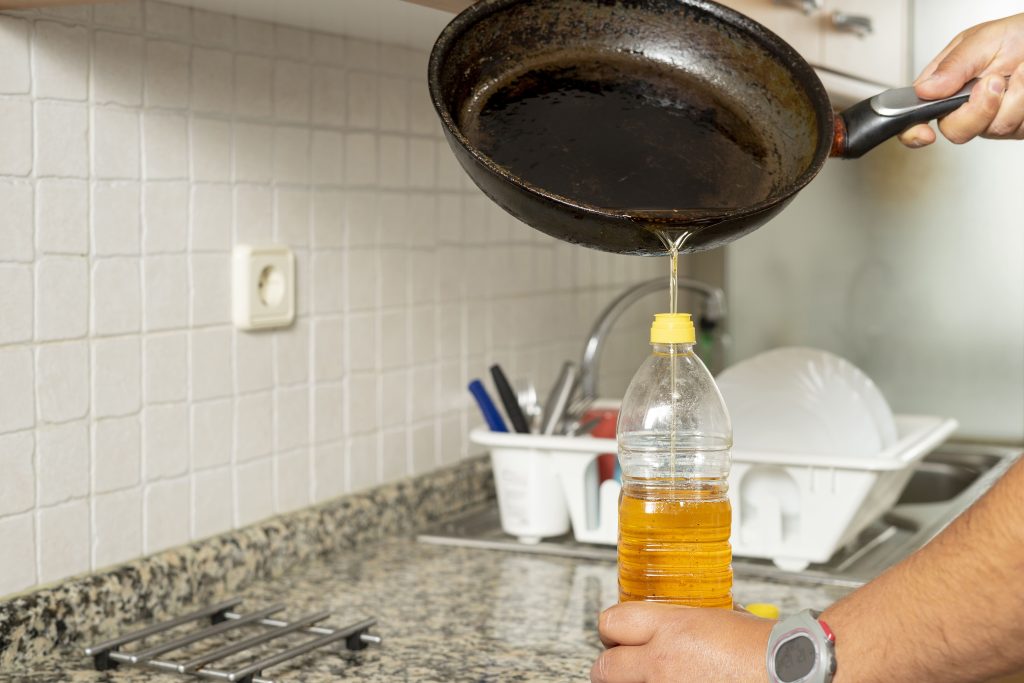Used cooking oil is a common byproduct generated by restaurants and other food establishments operating commercial kitchens. These establishments are bound to undergo a recycling process to transform their waste cooking oil and yellow grease into a valuable resource. Recycling used cooking oil doesn’t not only provide numerous environmental benefits and a healthy work environment but also contributes to the development of a sustainable economy. HOW?
Let’s explore the process of used cooking oil collection from restaurants, its storage, transport, and recycling process, and discuss the various benefits we may achieve from properly used fryer oil disposal and recycling.

Collection of Used Cooking Oil
Hundreds of food establishments that run commercial kitchens in California produce a significant amount of used cooking oil daily. To save our environment, it is necessary to ensure properly used cooking oil collection. Various methods are employed. One common method is the use of used oil storage containers placed in strategic locations within the premises. These containers are specifically designed to store used fryer oil and yellow grease safely. Additionally, some regions have dedicated collection services that visit establishments on scheduled routes to collect the used oil.
Proper collection of used cooking oil is crucial because it prevents the toxic substances from being poured down the drain or discarded with regular waste which is dangerous. When disposed of incorrectly, used cooking oil can clog pipes, pollute water bodies, harm the environment, and the destroy habitats of many creatures that are solely dependent on natural water sources. By implementing effective collection methods, restaurant owners and commercial kitchen operators can contribute to a cleaner and healthier environment.
Storage and Transportation
After the collection of used oil, it has to be stored and transported appropriately to ensure safety, prevent spillage, and preserve quality so that the restaurant owner can receive a good rebate check in exchange for that oil later.
Specially used oil storage containers, such as sealed drums or bins, are used to store the oil. These containers are designed to withstand the weight and volume of the oil and are equipped with secure lids to prevent leakage. There are different types of oil collection bins available in the market, it’s necessary to pick the container that may meet your need the best.
During transportation, it is critical to handle the containers with care to avoid accidents or spills. Transport vehicles should be equipped with safety measures such as spill-proof containers, secure fastenings, and proper ventilation. By following these storage and transportation guidelines, the risk of accidents can be minimized.
How Used Oil and Yellow Grease are Recycled
Used oil recycling involves several stages before converting it into biodiesel. The first step is pre-treatment, where we remove impurities such as food particles and water from the oil. This step is critical to ensure the quality of the recycled goods. At the Grease Company, we do this by going through a series of purification processes such as filtration or centrifugation. Once the oil is purified, it is ready to be recycled into biofuel/biodiesel.
Curious to know more about Biodiesel?
Biofuel production involves the conversion of used cooking oil into a renewable energy source. The oil undergoes a chemical process called transesterification, where we mix the oil with alcohol and a catalyst to break down the triglycerides and produce this “so much better alternative” to petroleum-based fossil fuel. We can use this alternative energy source as a substitute for conventional diesel fuel in vehicles, machinery, and even power plants.
Apart from biofuel production, we can recycle used oil to use in the manufacturing of various other usable goods. The high-fat content in used cooking oil makes it a valuable ingredient in soaps, detergents, and even the cosmetics industry.
Environmental Benefits of Recycling Used Cooking Oil
Used cooking oil collection and recycling may result in several vital environmental benefits. One of the significant advantages of cooking oil recycling is the reduction of landfill waste. If we dispose of used oil in landfills, it can contaminate the soil and water, leading to harmful effects on ecosystems. By recycling it, we can prevent this waste from ending up in landfills and minimize the environmental impact.
Furthermore, the recycling process helps decrease pollution and greenhouse gas emissions as the byproduct of recycling used oil (biodiesel) leaves less carbon footprint behind. Instead of being incinerated or left to decompose, recycled cooking oil can be converted into cleaner-burning biofuels. The use of biofuels helps reduce the release of harmful pollutants into the atmosphere, contributing to improved air quality and mitigating climate change
Economic Benefits
Apart from the environmental advantages, recycling used cooking oil offers tremendous economic benefits. As mentioned above, used fryer oils, and yellow grease are valuable feedstock to biodiesel. Biodiesel is a renewable energy source that reduces dependence on fossil fuels. This helps stabilize fuel prices and promotes energy security.
Also, the used cooking oil collection and recycling industry creates job opportunities and contributes to the growth of the green economy. This industry encourages innovation and investment in research and development for improved recycling technologies.
Staying in Compliance with the Regulations
Municipalities all around California has stated maintenance regulation for restaurants and any businesses that operate a commercial kitchen. The commercial kitchen plumbing regulation recites that it is the responsibility of the food establishment to properly manage their used cooking oil, waste vegetable oil, and yellow grease and contribute to recycling in them valuable goods. Local authorities have narrated firmly on the regulatory disposal of used oil by storing them and handing them over to a licensed IKG Hauler (UCO Collector) to ensure the safety of the environment. Restaurants and commercial kitchens are obligated to comply with these regulations to avoid penalties and maintain their operating licenses.
By adhering to regulatory requirements and participating in used cooking oil recycling programs, businesses demonstrate their commitment to sustainable practices and responsible waste management. It also enhances their reputation among environmentally conscious consumers, who appreciate and support businesses that cares about our mother nature.
want to know more about used cooking oil collection and recycling?
